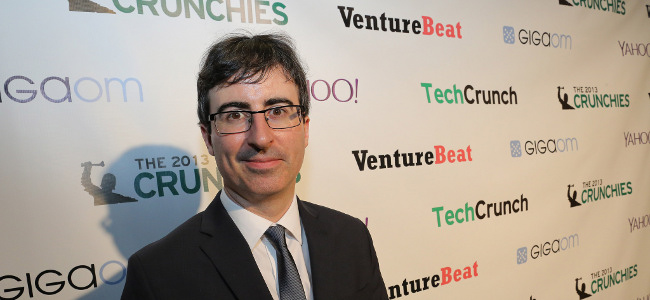When Charlie Rose read out Vanity Fair’s description of John Oliver as “perhaps the most disruptive journalist on television”, the British comedian replied with one syllable.
“Ergh.”
“I’m not a journalist at all,” Oliver said. “Obviously, I’m a comedian.”
But the problem for Oliver, who worked his way from the Cambridge Footlights via the British panel show Mock the Week onto Jon Stewart’s The Daily Show, is that for a man who claims not to be a journalist he seems to be doing a lot of journalism.
Journalism, at its essence, is about collecting new information, arranging and presenting it. And during his tenure as the host of Last Week Tonight that is exactly what Oliver has done.
Take, for instance, the recent segment on the Canadian election, which Oliver flagged explicitly as a bid to highlight the overlooked subject of politics in America’s biggest neighbour.
Much the same logic applies to his famous net neutrality segment, often credited with crashing the Federal Communications Commission’s website, as well as protecting the principle that Internet service providers should not discriminate in delivering different types of content.
When speaking to the self-described journalist Jorge Ramos in May, Oliver was quizzed on why he had gone out to interview the NSA whistleblower Edward Snowden in Moscow, and continued to maintain he was doing the job of a comedian and not a journalist.
“You have more credibility than most journalists here in the United States and I would say in many other countries,” Ramos countered.
“But that is more of an insult to the current state of journalism than it is a compliment for the state of comedy,” Oliver said.
There’s no doubt that humour, or more broadly entertainment, is what drives Oliver. But much the same can be said for the tabloid press in many Western countries.
The difference is that there is a morality to Oliver’s comedy that is more akin to the ideals of the Guardian or New Statesman. Oliver selects his topics partly to shine a light on important issues.
If that sounds like journalism, that is because it is. So why does Oliver pretend otherwise?
James Poniewozik, a writer for Time, thought this was the reason:
“When someone calls Oliver, Stewart or [Stephen] Colbert a journalist, it’s often because that person wants something – for the hosts to commit themselves to a certain cause or to declare neutrality; for them to commit to a certain seriousness of purpose; for them to accept their ‘responsibility’, however the labeller defines it; for them to fit into some one-size definition of how a journalist should behave and what they should care about.”
Poniewozik’s conclusions that such baggage “would definitely kill Oliver’s comedy” is hard to credit. Private Eye, the best muckraking title in Britain, is primarily known for its humour. But the editor Ian Hislop doesn’t pretend he isn’t a journalist.
And really there is little need for Oliver to keep up pretences. He’s a hack, just one with some decent gags.
Image Credit – John Oliver, February 2014 by TechCrunch
